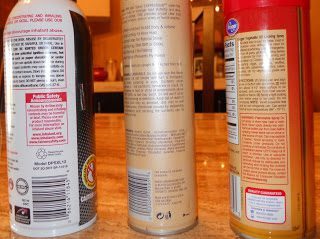“Deadly” household products…
If you were asked to name a few “deadly” household products easily found in your home, what items would be on the top of your list? You might think of matches, butane lighters, bleach, toilet bowl cleaner, razors, or even candles. Would your list include: whipped cream dispensers, hairspray, felt-tip pens, cooking sprays, static cling removers, leather cleaners, or aerosol computer keyboard cleaner? You will probably find these household products in most homes; however, as a parent would it occur to you that these items can cause serious damage to one’s body or even death when used as an inhalant to get “high?”
 |
| Click on the photo to enlarge |
Public Safety Announcement
We invite you to carefully review the Public Safety Announcement found on most readily available household inhalants. For example, on a can of aerosol computer keyboard cleaner there are the following warnings:
- Front of can has a danger circular symbol: INHALANT ABUSE CAN BE FATAL! Be Responsible!
- Front of can says CAUTION: CONTENTS UNDER PRESSURE, READ BACK PANEL CAREFULLY. KEEP OUT OF REACH OF CHILDREN
- Front of can has a red triangle with an exclamation point (!), under which it says: Contains a bitterant to help discourage inhalant abuse.
- Back top of the can says in red cap letters: MISUSE BY DELIBERATELY CONCENTRATING AND INHALING CONTENTS MAY BE HARMFUL OR FATAL. PLEASE USE OUR PRODUCT RESPONSIBLY. Contains a bitterant to help discourage inhalant abuse.
- Back of can Caution box says: KEEP OUT OF REACH OF CHILDREN. MISUSE BY DELIBERATELY CONCENTRATING AND INHALING CONTENT MAY BE HARMFUL OR FATAL.
- Back of can red box Public Safety Announcement: Misuse by deliberately concentrating and inhaling contents may be harmful or fatal. Please use our product responsibly. For more information on inhalant abuse visit: www.inhalant.org, www.inhalants.com, www.falconsafety.com.
Meet Richard and Karen Doherty…
According to news articles Richard and Karen Doherty’s 14 year old daughter, Aria, died from apparent cardiac arrest after inhaling computer keyboard cleaner. KTLA News reports: “Her older sister found her in bed with a can of compressed air still attached to her mouth, her nostrils taped shut.” The Daily News related: ‘The Dohertys had talked with all three of their teenage daughters about substance abuse. They kept prescription drugs locked away and recently purged their Porter Ranch, Calif. home of alcohol. The family doesn’t own any dangerous weapons. But the dangers of “huffing” took them completely off guard.’
NBC’s Diana Alvear reports for The Today Show
If you would like to view the video, you can see it here.
What parents and children need to know about “Huffing”
According to the Inhalant Abuse Prevention website here some facts regarding “huffing”:
- Over 2.6 million children, aged 12 – 17, use an Inhalant each year to get high.
- 1 in 4 students in America has intentionally abused a common household product to get high by the time they reach the eighth grade.
- Inhalants tend to be the drug that is tried first by children.
- “Sniffing” and “huffing” can begin at age 10 or younger.
- 59% of children are aware of friends huffing at age 12.
- Inhalants are the fourth most-abused substance after alcohol, tobacco, and marijuana.
- The number of lives claimed by Inhalant Abuse each year is unknown because these deaths often are attributed to other causes.
Additionally, About.com offers the following advice:
“First of all, using inhalants clouds a person’s ability to make good decisions. If you inhale, you’re more likely to get into an accident or a fight.
Second, you can die from inhaling. Lots of people choke on their own vomit after inhaling, and some people’s hearts just stop beating. This is known as Sudden Sniffing Death Syndrome. People who inhale from a bag or in closed spaces can suffocate to death.
Third, inhaling puts you at risk for serious health problems, including permanent damage to your brain, central nervous system, bone marrow, and sense of hearing or smell. Kidney, lung and liver damage can also result from inhalant use, as can severe nosebleeds and headaches. Some people even experience depression from using inhalants.”
Finally, Dr. Charles Sophy, Medical Director of the LA County Department of Children and Family Services, offers warning signs that parents can be alerted to:
- Look for sores on the mouth
- Watch for missing household products
- Notice if your child is acting drunk, and if there is a change in friends, academics and/or sleep patterns.






